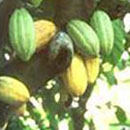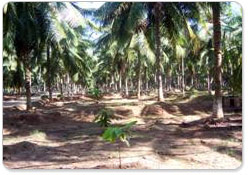
Cocoa is hardly grown as a mono crop. Its imminent capacity to share the alley spaces of tall growing coconut and arecanut palms and its combining ability with the microclimatic conditions available in such perennial gardens helps its cultivation in utilizing such areas without exacting for an independent growing climate of its own.
The area under cocoa prior to 1980 was 22,600 ha with an estimated production of 3200 MT of dry beans. Kerala is the major state holding 18,000 ha with 1500 MT of production. In Tamil Nadu planting of cocoa started in 1980s. Cocoa was planted at Kanyakumari, Dindugal, Tirunelveli and Coimbatore (Pollachi) districts. Cocoa farming failed at that time because of procurement problem. In late 90s i.e., 1998 planting started again. Seedling of F1 hybrids from biclonal seed garden, Kerala Agricultural University was used as planting material. Grafts and clones were also available from CPCRI, Vittal.
Out of total area under cocoa in Tamil Nadu, Coimbatore district contributes more than 90 % of the area. Now Cocoa is grown at Coimbatore, Dindugal, Theni and Tirunelveli districts. Government of Tamil Nadu and Cadbury India Private Ltd., have planned to bring about 6000 ha per year under cocoa cultivation for the next five years.
| Sub Basin | - | PAP-Aliyar |
| Implementing Unit | - | Coconut Research Station, Aliyar |
| Physical area covered | - | 100 ha |
| Number of beneficiaries | - | 37 |
With an aim to bring more area under cocoa cultivation and to provide an additional income to the coconut growers, cocoa was introduced as an intercrop in Aliyar sub basin area (100 ha) in three of the blocks.
| Name of the Block | Area (ha) | Beneficiaries |
|---|---|---|
| Pollachi North | 9.0 | 5 |
| Pollachi South | 21.0 | 6 |
| Anaimalai | 70.0 | 26 |
| Total | 100.0 | 37 |
Under this project, a MoU was signed between Cadbury India Private Ltd., and TN–IAMWARM cocoa beneficiaries. The farmers will grow the cocoa plants as intercrop in their coconut plantations and sell cocoa beans back to Cadbury India Ltd., at the prevailing market rates subject to a minimum of Rs. 60/ kg for a period of five years. The beans should meet company's quality specifications. The farmers shall be eligible for a financial assistance of Rs. 11, 250 / ha for establishing the cocoa garden.

Growing cocoa as an intercrop can fetch additional income of Rs. 20,000 against Rs.15,000/- per acre as monocrop. There prevails a wide gap between demand and supply of cocoa beans. Production of cocoa beans is about 10,000 MT, whereas the requirement of confectionary industry alone is about 18,000 MT. Moreover the assured market price, buy back arrangement made by Cadbury India Private Limited would favour cocoa cultivation in future as an intercrop in coconut gardens in the sub basin area.